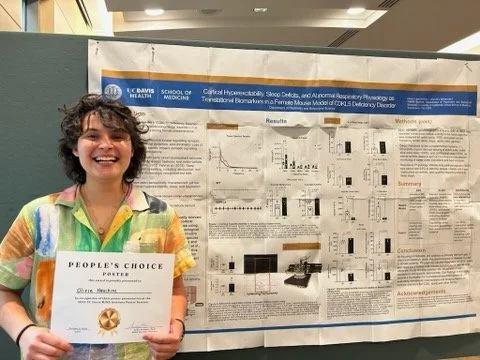Researchers awarded $1.4 million to develop gene therapy for rare genetic condition
Grant from the California Institute for Regenerative Medicine will fund research to study CDKL5 Deficiency Disorder (CDD).
Silverman Role: Co-Investigator (PI, Fink)
TOTAL FUNDING: $1,400,000
California Institute for Regenerative Medicine (CIRM), DISC2, 11/1/2021-10/31/2023
AAV9-Cas13 gene therapy for Angelman syndrome
Silverman Role: co-Investigator (PI, Segal)
**This grant was scored as the top grant in the State of California, competing against > 100 applications**
TOTAL FUNDING: $1,364,903
R01 (NIA/AG074709) Bein, Lein (Contact), Van Winkle (M-PI) 05/01/2021– 04/30/2026
Traffic-related air pollution exacerbates AD-relevant phenotypes in a genetically susceptible rat model via neuroinflammatory mechanism(s)
Silverman Role: co-Investigator MPIs (Lein, Van Winkle, Wexler)
**This grant was the result of preliminary data collected from 2 R21s from NIEHS, one was awarded to Drs. Silverman, Lein and Berg to investigate the role of Traffic-related air pollution and neurodevelopmental phenotypes in rats via neuroinflammatory mechanism(s); another one was awarded to Drs. Lein, Silverman and Berg to investigate the role of Traffic-related air pollution and neurodegenerative phenotypes in rats via neuroinflammatory mechanism(s); another one was awarded to Drs. Lein, Silverman and Berg**
TOTAL FUNDING: $3,843,246
Foundation for Angelman Syndrome for Therapeutics (FAST), 09/01/2023-2/28/2023
FDA enabling studies from IND application on expression of UBE3A via lentivector delivery in blood cells to treat Angelman Syndrome
Silverman Role: co-Investigator (PI, Anderson)
TOTAL FUNDING: $893,842
Children’s Miracle Network
CNKSR2-RELATED DISORDER IN MOUSE AND ZEBRAFISH ANIMAL MODEL SYSTEMS, pending NOA
Silverman and Copping Roles: co-Investigator (PI, Dr. Joseph Shen)
TOTAL FUNDING: $150,000
ULTRAGENYX PHARMACEUTICAL INC. 05/01/2021-10/31/2022
Assessment of Antisense Oligonucleotides for Dup15q Syndrome
Silverman and Copping Roles, PIs
TOTAL FUNDING: $139,000
NIH/NIMH 1R13MH126604-01 $20,000 05/01/2021-04/30/2022
Promoting Diversity and Inclusion for the International Behavioral Neuroscience Society
Silverman Role: co-Investigator (PI, Dr. Jared Young, UCSD Anderson)
TOTAL FUNDING: $20,000
Foundation for Angelman Syndrome for Therapeutics (FAST) 9/01/2020-3/31/2022
Translational Analysis of Gait as a Primary Outcome Measure in Angelman Syndrome
Silverman Role: contact PI (co-PIs Duis, Silverman)
TOTAL FUNDING: $282,870
Foundation for Angelman Syndrome for Therapeutics (FAST) 01/01/2020-12/31/2025
FAST Research Infrastructure Grant: Training the Next Generation of Angelman Syndrome Scientists
Silverman and Berg Roles, co-Investigators (PI, Segal)
TOTAL FUNDING:$2,976,004
NIH/NINDS 1R01NS097808-01A1 4/15/2017-1/31/2022 NCE until 01/31/2023
Phenotypic Characterization of Novel Models of Dup15q Syndrome
Silverman Role: contact PI
TOTAL FUNDING: $1,715,000
NIH/NIMH 1R01MH116244-A01 01/01/2019-12/31/23
Chromatin remodeling factor dosage-sensitivity in neurodevelopmental disorders
Silverman Role: Co-Investigator
TOTAL FUNDING: $2,491,615
NIH/NICHD, P50HD103526 10/1/2013-5/31/2025
MIND Institute Center for Excellence for Intellectual Disabilities IDDRC
TOTAL FUNDING: $1,300,000
Silverman Roles: Co-Investigator and Co-Director, Rodent Behavioral Core and Director, Mouse Behavioral Core, (PI Abbeduto)
NIH/NINDS 1U54NS079202-01 09/1/2012 – 8/31/27
UC Davis Counter ACT Center of Excellence
Novel Anticonvulsant and Neuroprotective Therapies for TETS and OP Intoxication
Mitigation of Neurological Damage Following Seizures
Silverman Roles: Co-Investigator Project 3 PI: (co-PIs Gurkoff, Silverman) Center PI (PI, Lein)
TOTAL FUNDING: $3,778,502
NIH/NIA 5P01AG062817-03 10/01/2023-09/30/20
Investigations of targets, mechanisms, and optimal delivery of therapeutic ketosis for functional longevity and treatment of Alzheimer's disease
Elucidating biomarkers and mechanisms of the Ketogenic longevity mechanism
Silverman Role: Consultant (PI Cortopassi)
TOTAL FUNDING: $2,342,299














